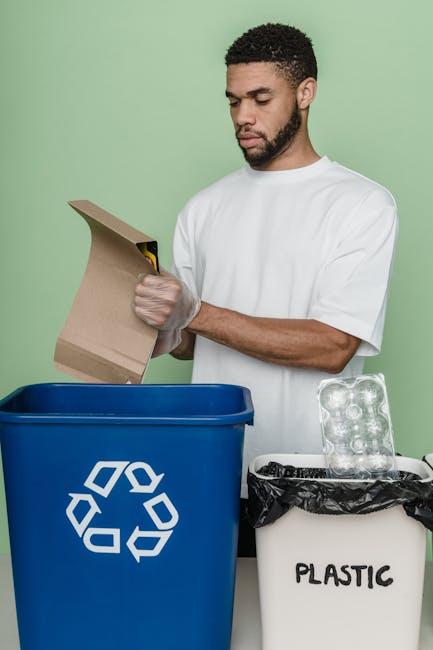In an age where sustainability is no longer merely a buzzword, the quest for eco-amiable alternatives has taken center stage in our everyday lives. Among the most convenient yet environmentally taxing products are single-use cleaning wipes, often wrapped in plastic and discarded after a single use. As the world grapples with increasing plastic waste and its adverse effects on the surroundings, biodegradable cleaning wipes emerge as a beacon of hope, offering a practical solution that doesn’t compromise on cleanliness or convenience. these compostable alternatives not only help reduce our reliance on single-use plastics but also promote a circular economy, where waste transforms into a resource rather than a burden. This article explores the innovative landscape of biodegradable cleaning wipes, delving into their benefits, materials, and the pivotal role they play in fostering a more sustainable future. Join us as we unravel the science behind these eco-conscious products and their potential to reshape our cleaning routines for the better.
the environmental Impact of Single-Use Plastics in Cleaning Products
The widespread use of single-use plastics in cleaning products, such as wipes and spray bottles, has devastating effects on our environment. These products often end up in landfills and oceans, where they take centuries to degrade, polluting ecosystems and harming wildlife. the production and disposal of plastic items contribute substantially to greenhouse gas emissions and resource depletion, creating an urgent need for sustainable alternatives. By shifting to biodegradable cleaning options, we can significantly reduce our ecological footprint and promote a healthier planet.
Biodegradable cleaning wipes provide an innovative solution to the plastic pollution crisis. Made from natural fibers, these wipes break down more quickly than traditional plastics, making them a better choice for the environment.Moreover, they can be composted, turning back into nutrient-rich soil rather than lingering in landfills. Adopting these alternatives can lead to:
- Reduced plastic waste in landfills.
- Lower carbon emissions from production processes.
- Safe biodegradation in composting facilities.
- Improved soil quality upon decomposing.
In essence, embracing biodegradable options not only promotes sustainable cleaning practices but also nurtures the environment for future generations.

Understanding Biodegradable materials: What Makes Wipes Compostable
In a world increasingly sensitive to environmental concerns, biodegradable materials have emerged as viable alternatives to traditional plastics. These materials are designed to break down more naturally over time, especially under specific environmental conditions. Compostable wipes, for instance, are crafted from fibers like bamboo, cotton, or a blend of biopolymers that can degrade back into organic matter when placed in a composting environment. This is crucial because it means they can return nutrients to the soil rather than adding to landfill bulk.the biodegradable nature of these materials is typically enhanced by the absence of synthetic additives, making them not just environmentally friendly but also safe for human use.
Understanding what makes these wipes compostable involves looking at several factors: composition, certifications, and conditions. Certified compostable products meet stringent standards set by organizations like ASTM International or the European EN 13432. For prosperous composting, wipes must decompose within a specific timeframe, typically 90 to 180 days, under optimal conditions in a compost facility. Additionally,the environmental impact is further minimized because the manufacturing processes often focus on sustainability,reducing water and energy use. here’s a brief comparison of key attributes:
| Attribute | Biodegradable Wipes | Conventional Wipes |
|---|---|---|
| Material Source | Natural Fibers | Plastic and synthetic |
| Decomposition Time | 90-180 Days | Decades |
| Compostable Certification | ASTM/EN Certified | No certification |
| Environmental Impact | Low | High |

Key Advantages of Choosing Biodegradable Cleaning Wipes for a Sustainable Home
Opting for biodegradable cleaning wipes not only supports your commitment to a sustainable lifestyle,but also offers tangible benefits for both your home and the environment. Unlike traditional wipes that can take centuries to decompose, biodegradable options break down naturally through microbial action, significantly reducing landfill waste.This eco-friendly choice actively contributes to lowering your carbon footprint and minimizing pollution, making your daily cleaning routine a step towards a greener planet. Moreover, these wipes are often made from natural materials, which means they are gentler on your skin and the surfaces of your home.
Incorporating biodegradable wipes into your cleaning arsenal transforms mundane tasks into eco-conscious practices. Some key benefits include:
- Non-Toxic Ingredients: Many biodegradable wipes are crafted with plant-based formulas that are safe for your family and pets.
- Convenience: Easy to use and dispose of, these wipes allow for swift clean-ups without compromising your environmental values.
- Compostable After Use: When you finish using them,these wipes can often be composted,enriching the soil rather than contributing to landfill waste.
To illustrate the impact of switching to biodegradable cleaning wipes, consider the following comparison:
| Feature | Traditional Wipes | biodegradable Wipes |
|---|---|---|
| Decomposition Time | Hundreds of years | Weeks to months |
| Environmental Impact | High (plastic waste) | Low (compostable) |
| Skin-Friendly | Often contains harsh chemicals | Gentle and natural |
Embracing biodegradable cleaning wipes means not just cleaning your home, but doing so while nurturing the environment and taking proactive steps towards sustainability.

Practical Tips for Transitioning to Compostable Wipes in your Daily Routine
Making the shift to compostable wipes involves integrating them seamlessly into your daily life. Start by replacing standard single-use wipes with compostable options in key areas of your home. As a notable example, keep a pack in kitchens and bathrooms for quick cleanups, ensuring they’re easily accessible. This small change can have a important impact on reducing plastic waste.When shopping, look for products labeled with certifications that indicate they are truly biodegradable and compostable, ensuring they meet environmental standards.
To further ease the transition, consider creating a designated compost collection spot in your kitchen or bathroom. This can be a small bin or a compostable bag where you can conveniently toss used wipes, reminding you to compost them rather than throw them away. Additionally, educate friends and family about the benefits of compostable wipes. Share your newfound knowledge and encourage them to join the movement. You might even host a small get-together to demonstrate eco-friendly cleaning practices, fostering a community that values sustainable choices.
Insights and Conclusions
As we draw the curtains on our exploration of biodegradable cleaning wipes, it becomes clear that these innovative products are more than just a trend—they represent a pivotal shift towards sustainability in our everyday lives. Amidst the clamor of plastic waste and environmental concerns, compostable alternatives emerge as beacons of hope. They invite us to rethink our habits,urging us to opt for choices that honor both our health and the planet.
Whether you’re a dedicated eco-warrior or simply looking to reduce your household’s ecological footprint, biodegradable cleaning wipes offer a practical and responsible solution. By embracing these alternatives, we can all take meaningful steps toward a cleaner, greener future, where convenience and sustainability coexist harmoniously.
As you reconsider your cleaning routines, remember that every small change counts. So, the next time you reach for a cleaning wipe, think compostable—your choice could contribute to a healthier planet for generations to come. Let’s wipe away the old narrative of single-use plastics and embrace a cleaner, biodegradable path forward.



